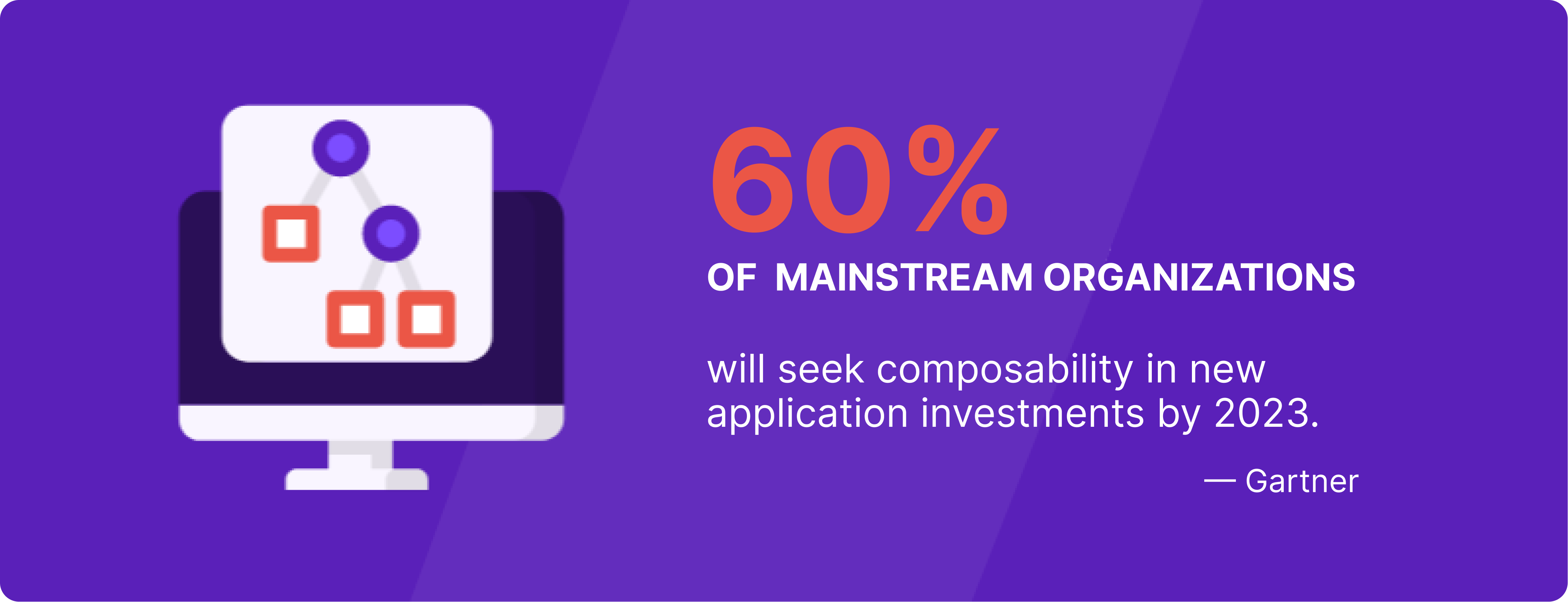Composable DXP & compliance: Essential guide for the enterprise

Share
.jpg&w=3840&q=75)
A composable DXP redefines your business's digital strategy. Yet, adhering to regulatory compliance may prove difficult. Keep reading to get clear insights and critical compliance strategies to ensure your platform is both secure and efficient.
Highlights
Achieving regulatory compliance in a composable DXP takes:
- Assessment: Always evaluate your digital platform to know your compliance status
- Know the standards: Understand relevant regulations, such as GDPR and ISO/IEC
- Action Plan: Develop a strategy to address all compliance gaps
- Employee education: Train your team on adhering to regulatory compliance
Navigate the complexities of regulatory compliance within your composable DXP with clarity and confidence. Switch to a compliant composable DXP to ease the process. Request a free demo to get started today.
Keep reading to learn more!
A composable DXP is a digital platform that comprises several tech solutions that integrate via APIs and share data using a headless system. It is cloud-native and flexible and allows you to deliver customized solutions and omnichannel content to your customers in real time.
Unlike monolithic DXPs, they are not all-in-one. So, you can integrate various solutions from any vendor of your choice. You build your digital experience platform using only solutions that matter to your business. It also uses a microservices architecture, with several independent small services that interact via APIs.
That design throws up some compliance issues, especially since it is a distributed system. Also, how can businesses ensure that the DXPs adhere to strict security standards and global data privacy laws from international and regional standards organizations?

Compliance in DXPs
Compliance in DXPs covers all standards that digital platforms must adhere to in terms of quality, security, and data privacy and protection. It guides businesses towards legal and safe digital operations. It is a vital part of composable DXP security.
As businesses follow these guidelines, they improve data privacy, build trust with customers and partners, and find it easier to access new markets.
There is a long list of compliances for DXPs, but the GDPR and ISO/IEC are two of the most common ones. They focus on data protection and privacy, security and smooth integration of digital services. But there are others, depending on your region or industry.
Start your free trial with Contentstack today. Transform your brand's digital presence with Contentstack's open MACH architecture and industry-leading technology. Witness a significant reduction in publishing and development time, and elevate your content management. Start your free trial now.
For instance, the PCI DSS sets the standards in credit card payment security, while HIPAA focuses on organizations in the healthcare sector. Other compliance frameworks are the CCPA for California residents, the Sarbanes-Oxley Act for financial record keeping, and the CSA Star for cloud solutions.
While some compliances are global, others are regional or based on industry. It is essential that you find relevant ones that apply to your business to ensure you meet the requirements and stay up to date. Aside from data privacy and security, adhering to these standards improves the customer experience and boosts your brand image.
Data privacy and protection in digital platforms
Events of data breaches have continued to rise in recent times. For instance, the Royal Mail suffered a ransomware attack that affected 11,500 post offices, while the US State Department was a victim of a data breach that leaked about 60,000 emails. Both attacks were among many in 2023.
A World Economic Forum report also expects losses from cybercrimes to hit over $23.84 trillion by 2027, up from $8.44 trillion in 2022. These are clear signs that organizations must prioritize data privacy and regulatory compliance.
It is also for that reason that international bodies have laid down strict laws to govern data usage. For instance, the GDPR handles data privacy regulations for EU citizens — highlighting the need for transparency and user consent.
Overview of security and regulatory standards for DXPs
The ISO/IEC 27001 and GDPR are two of the most popular global standards, but there are others that help secure your digital assets, as follows:
- Payment Card Industry Data Security Standard (PCI DSS).
- California Consumer Privacy Act (CCPA).
- Health Insurance Portability and Accountability Act (HIPAA).
- Cloud Security Alliance's Security, Trust & Assurance Registry (CSA STAR).
- Sarbanes-Oxley Act (SOX).
- National Institute of Standards and Technology (NIST).
- Federal Information Security Management Act (FISMA).
These regulatory standards outline various strategies that organizations must follow to create safe digital environments. That includes regular system audits, risk assessments, and data encryption, among other measures. These actions enable organizations to protect customer data and comply with global regulations.
Compliance challenges in a composable DXP
Composable DXPs integrate various digital services from different vendors. Each vendor solution has its unique compliance needs. So, managing compliance may not be straightforward. Compliance rules may also vary by region or industry, which adds to the complexity.
Also, you want to consider the fast pace of technology and global businesses. Vendors are always releasing new updates and patches. So it may be difficult to keep up. These are some of the most common compliance challenges you can face in your digital system.
Yet, if there is one system that is built to manage these challenges, it is a composable DXP. It requires a strategy that enables you to track the platform, integrate advanced security systems and understand regulatory requirements for all business units.
Composable DXP compliance strategies
- Train your staff: Educate your team on risks, compliance requirements and the latest security in composable DXPs. Having staff with expert knowledge of security and compliance reduces human error.
- Use a central compliance control: Ideally, you want to track the platform and all third-party services to ensure they align with all compliance standards. Using a central dashboard gives you that overall view.
- Use a risk-based approach: Focus more resources on services and DXP components with higher risks. Refer to GDPR and ISO/IEC 27001 to know the risk profile of each DXP unit and adjust your strategy if you have to.
- Regular audits and updates: Regular audits show you the current status of your DXP. That proactive approach helps you identify areas in which you are lagging. Regular updates also help you keep up with new security issues.
- Implement API security: APIs are a staple in composable DXPs. So, you want to secure them using the right tools, such as OAuth. You may also rotate the API keys and use only secure HTTPS connections to access them.
Strategies to maintain a compliant tech stack
Security and digital experience platform compliance efforts do not stop the moment you implement compliance strategies. It is an ongoing process. So, set up periodic audits and document your compliance practices. Liaise with your vendors to ensure they continue to align their services with compliance requirements.
Start your free trial with Contentstack today. Transform your brand's digital presence with Contentstack's open MACH architecture and industry-leading technology. Witness a significant reduction in publishing and development time, and elevate your content management. Start your free trial now.
The role of headless CMS in composable DXP compliance
A headless CMS separates content storage from its presentation. So, the back end and front end are decoupled. But how does it improve compliance? Here are the ways it does it.
- API-first approach: API-first implies that you develop APIs way before you write a single line of code. So, you can implement security compliance and data privacy rules when building APIs before you set up the DXP.
- Decoupled architecture: A headless CMS only comes with a back end. So, they rely on APIs to connect to front-end systems. So you can apply relevant controls and compliances to the back end. With that sorted, you can then distribute secure content from your compliant back-end system to any front-end device.
- Flexible and scalable: A headless CMS enables you to manage and deliver content at scale. By extension, it allows you to adapt to changing compliance requirements more easily.
Case studies
Community Platform
As an immigration service provider, community platform prioritized security. Contentstack’s SOC 3-compliant DXP offered that security and enhanced site integration. It also boosted productivity by 50% and publishing speed by 75%.
Hear from the director of content. “I’ve looked at more than half a dozen CMSes, and Contentstack came to the top for all the right reasons. The product is incredibly user-friendly. The support team was excellent. The integration with our system was seamless.”
Read more about how Community Platform boosted productivity with a secure and compliant DXP.
MoneyHero Group
MoneyHero wanted to serve their FinTech customers better with reliable security and fast updates. Contentstack’s composable DXP enabled them to do that. The headless CMS and apps improved content delivery and boosted product rollout time by 85%.
Hear from Andrew de Ridder, the Head of Application Engineering. “The technical tooling and APIs that Contentstack provides allows our engineering teams the power and flexibility to surface content wherever it's needed, from multiple websites in different regions, to email, social media, or whatever use case comes next.”
Read more about how MoneyHero delivered content agility via Contentstack’s composable DXP.
FAQ section
What is a composable digital experience platform (DXP)?
A composable DXP is A digital platforms that enable you to build your tech stack with digital services from various vendors. It does not restrict you to a single vendor. It is API-first and headless, and you only select solutions that fit your business needs.
Why is compliance important in composable DXPs?
Compliance is important for many reasons. It gives you a legal and secure digital environment to work with. It helps you stay up to date with the latest security threats in your industry. It also helps you ensure you work with a secure digital platform. These factors help you build trust and improve your business outcomes.
How can organizations overcome compliance challenges in composable DXPs?
They must stay up to date on all industry, global and regional regulatory standards that apply to them. They can also overcome compliance challenges by adopting strong security practices and improving data governance.
What are some examples of regulatory standards affecting composable DXPs?
The General Data Protection Regulation (GDPR) and ISO/IEC standards are two of the most common ones. However, there are other relevant standards such as the CCPA for California residents, PSI DSS that applies to credit card payments, and HIPAA, relevant to the healthcare industry.
What strategies can be used to ensure data privacy in composable DXPs?
There are several strategies that promote data privacy, such as API security, data masking, user access controls and encryption. Also, ensure to comply with the guidelines of regulatory bodies on data privacy, such as GDPR.
Learn more
With a composable DXP, you are on a sure path to agility, innovation and customer satisfaction. Yet, compliance issues stand in the way. Follow proven strategies such as API security, regular audits, and employee training. Also, deploy analytics tools to track your compliance performance.
Revamp your digital strategy and align your compliance needs with the right DXP. Contentstack’s composable DXP is SOC3-compliant and gives you a headstart. Request a free demo today to get a first-hand experience.



